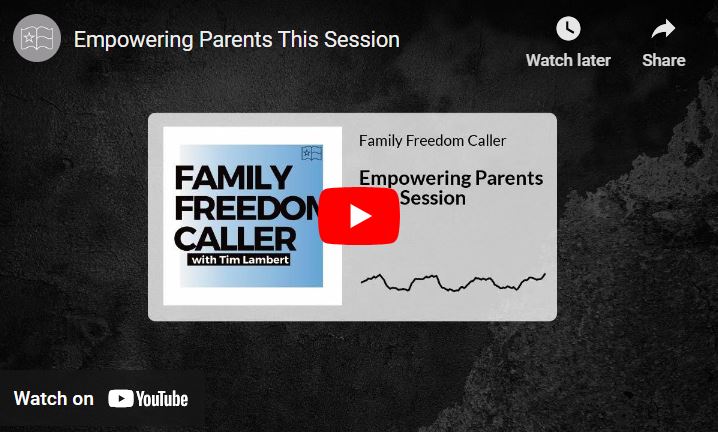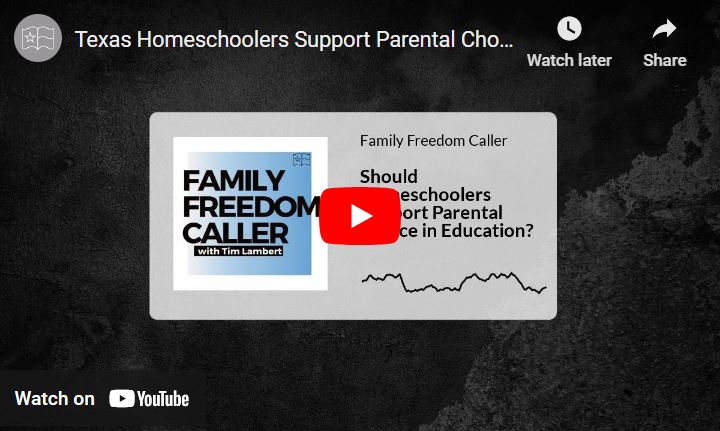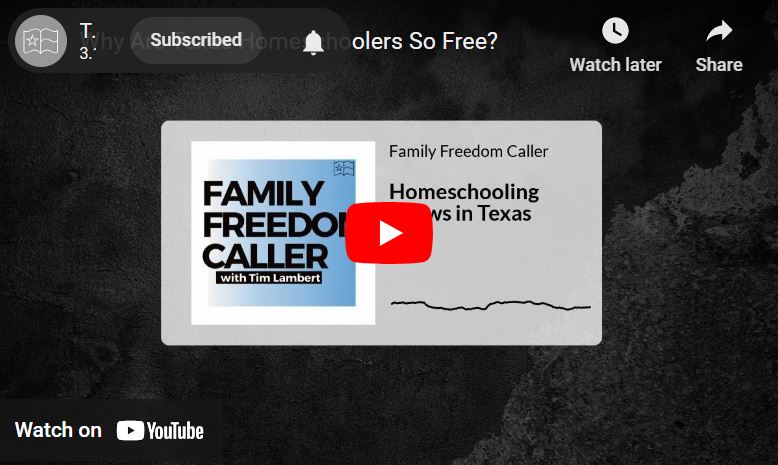By Donna Schillinger
Am I smart enough to homeschool?
It’s a common question—we may field it from others, we may ask it of ourselves. Perhaps many families begin with romantic notions of home education without really thinking much about where this is all leading. But around fourth grade something happens, usually math. Maybe it’s fractions, or percentages, or the difference between the direct and indirect object. A headache ensues, Google is consulted, and we fall asleep that evening with a chilling thought, What if I’m not smart enough to homeschool?
This is an easy question to dispel in terms of the legality of homeschooling. There is no required level of intelligence for a parent to homeschool in the state of Texas. The chances of your credentials being called into legal question are slim, but should that ever happen, pick up the phone and call Texas Home School Coalition.
One Simple Principle that Proves You’re Smart Enough to Homeschool
Academically, you only technically need to be one lesson ahead of your child to be able to teach. In theory, an illiterate parent could teach a child to read, as she is teaching herself to read. More often, it’s not basics like reading that are in question, but things we learned briefly in school then never applied—like anything about the periodic table. Yet the same principle applies, if you are one lesson ahead of your student, you can teach it. This is quite handy because a homeschooling parent has to teach every grade, not just one grade like public school teachers do. The decision to homeschool can very well mean learning it all over again, right along with your student. If you want to.
How to teach what you don’t know
Parental involvement in home schooling can be as intense as you want it to be. Some parents develop their own curricula from scratch and teach every subject, but most use professionally developed curricula that have varying levels of helps for parents. These can range from teacher’s guides with answer keys to instruction so thoroughly methodized that all the parent needs to do is provide the structured home environment to ensure the student is “showing up” for lessons every day.
It is entirely possible to home school your student on subjects you never learned and never will learn—you just need the right curriculum. Want your student to learn chemistry, trigonometry, Russian, physics? There’s a curriculum for that! Using a full-instruction curriculum isn’t a cop out—it’s a smart way to supplement your own areas of intelligence, and the vast majority of home schooling families use something like this to some degree. Learn more about types of curricula, and subscribe to THSC emails, newsletter and Review magazine for curriculum reviews and more.
Enhance Your Strengths
So we’ve addressed the legal and academic aspects of this “smart enough” issue, which leaves only this: Do you believe you’re smart enough? Let’s disarm this nagging doubt by calling it what it is—a confidence issue. Every parent has areas of high and low competency; you are no different. Maybe you’re a great cook and athlete but never did well in school. So teach your child to cook and be fit and healthy, and supplement the rest with curricula, co-ops, tutors, swap teaching arrangements, community classes, books and documentaries, guided field trips and more—all of which your student will likely enjoy far more than sitting under the tutelage of one person all day long.
Parent, there are so many more important reasons for home schooling besides academics. Chances are your own reasons for home schooling have little to do with academic content. You have a lot to offer your student, regardless of how book-smart you are. To borrow from the daily affirmation of Stuart Smalley: You’re good enough, you’re smart enough and doggone it, your kids like you!
Boost your confidence even more by accessing all the benefits of THSC membership. Join today!
***
Donna Schillinger homeschooled her two children for 11 years. She is president of the Micah 6:8 Initiative in Rogers, Ark., which addresses food and housing insecurity in Northwest Arkansas.
By Donna Schillinger
Am I smart enough to homeschool?
It’s a common question—we may field it from others, we may ask it of ourselves. Perhaps many families begin with romantic notions of home education without really thinking much about where this is all leading. But around fourth grade something happens, usually math. Maybe it’s fractions, or percentages, or the difference between the direct and indirect object. A headache ensues, Google is consulted, and we fall asleep that evening with a chilling thought, What if I’m not smart enough to homeschool?
This is an easy question to dispel in terms of the legality of homeschooling. There is no required level of intelligence for a parent to homeschool in the state of Texas. The chances of your credentials being called into legal question are slim, but should that ever happen, pick up the phone and call Texas Home School Coalition.
One Simple Principle that Proves You’re Smart Enough to Homeschool
Academically, you only technically need to be one lesson ahead of your child to be able to teach. In theory, an illiterate parent could teach a child to read, as she is teaching herself to read. More often, it’s not basics like reading that are in question, but things we learned briefly in school then never applied—like anything about the periodic table. Yet the same principle applies, if you are one lesson ahead of your student, you can teach it. This is quite handy because a homeschooling parent has to teach every grade, not just one grade like public school teachers do. The decision to homeschool can very well mean learning it all over again, right along with your student. If you want to.
How to teach what you don’t know
Parental involvement in home schooling can be as intense as you want it to be. Some parents develop their own curricula from scratch and teach every subject, but most use professionally developed curricula that have varying levels of helps for parents. These can range from teacher’s guides with answer keys to instruction so thoroughly methodized that all the parent needs to do is provide the structured home environment to ensure the student is “showing up” for lessons every day.
It is entirely possible to home school your student on subjects you never learned and never will learn—you just need the right curriculum. Want your student to learn chemistry, trigonometry, Russian, physics? There’s a curriculum for that! Using a full-instruction curriculum isn’t a cop out—it’s a smart way to supplement your own areas of intelligence, and the vast majority of home schooling families use something like this to some degree. Learn more about types of curricula, and subscribe to THSC emails, newsletter and Review magazine for curriculum reviews and more.
Enhance Your Strengths
So we’ve addressed the legal and academic aspects of this “smart enough” issue, which leaves only this: Do you believe you’re smart enough? Let’s disarm this nagging doubt by calling it what it is—a confidence issue. Every parent has areas of high and low competency; you are no different. Maybe you’re a great cook and athlete but never did well in school. So teach your child to cook and be fit and healthy, and supplement the rest with curricula, co-ops, tutors, swap teaching arrangements, community classes, books and documentaries, guided field trips and more—all of which your student will likely enjoy far more than sitting under the tutelage of one person all day long.
Parent, there are so many more important reasons for home schooling besides academics. Chances are your own reasons for home schooling have little to do with academic content. You have a lot to offer your student, regardless of how book-smart you are. To borrow from the daily affirmation of Stuart Smalley: You’re good enough, you’re smart enough and doggone it, your kids like you!
Boost your confidence even more by accessing all the benefits of THSC membership. Join today!
***
Donna Schillinger homeschooled her two children for 11 years. She is president of the Micah 6:8 Initiative in Rogers, Ark., which addresses food and housing insecurity in Northwest Arkansas.











